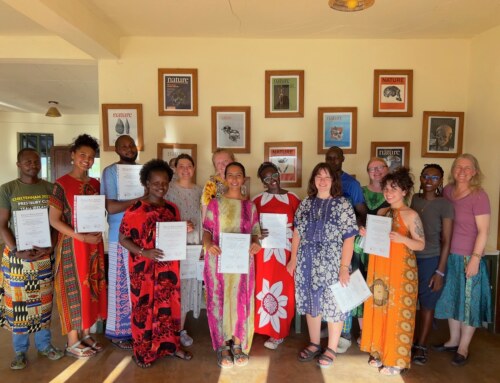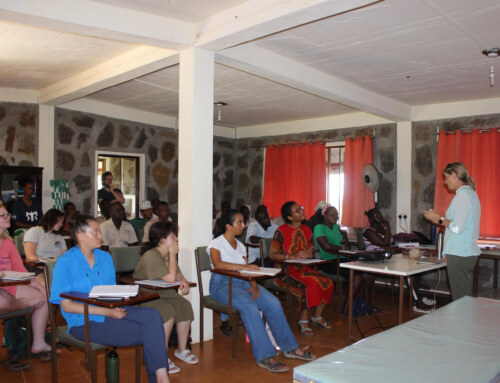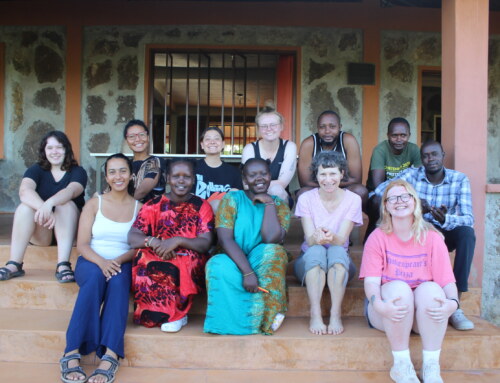
Over time, anthropologists have been exploring the complexities of different societies through human and cultural interactivity, mainly by living, and practicing the community’s way of life to acquire first-hand information from an “insiders” perspective. This week, the students have been introduced to the Dassanach culture, where they have been observing, conducting discussions, and interacting with the community. Zane Swanson, a PhD student at Duke University, is the leading instructor for the Cultural Immersion and Human Biology course, which integrates the culture, life-history, and health of the Dassanach people he has been studying for a couple of years. As he puts it, “This is an interesting community to study, as one can learn about pastoralism, and at the same time understand the effects of modernization on a culture that is different from western cultures.” The Dassanach are a semi-nomadic Cushitic group that belongs to the Afro-Asiatic family, inhabiting the north-eastern shores of Lake Turkana. Students have also been learning the basics of Dassanach and Swahili languages (taught by Zane, Wambui and Medina, respectively) to help them converse easily with the locals (interpreters are present to assist with communication).

Zane leads the students discussion on Universalism and Relativism. Photo credit: Medina Lubisia.
The establishment of the Turkana Basin Institute did not only provide employment opportunities to the locals, but also paved way to the establishment of a Community Outreach Program that serves communities in Ileret (east side) and Turkwel (west side of the lake). The main goals of the program are to empower the communities, and bring about positive, sustainable changes. At Ileret, this has been achieved through the development of a health centre, schools, hiring nurses and teachers, scholarships for students, and a mobile clinic. Joanne Velo, the TBI Community Development Manager working with the community, introduced students to the ongoing community programs, partnerships, and other activities they have been involved in (such as maternal-child health, nutrition program, girl-child education and menstrual health), and the challenges they encounter in delivering these services. This was an eye-opener to the students, as it exposed them to the realities of working in a marginalized region.
We visited the Ileret ward administrator, Mr. Koriye M. Koriye, who welcomed the students to the community. He talked about his management roles, benefits of devolution, and the challenges they faced being far from the headquarters in Marsabit. So far, students have noted differences in values, attitudes, and practices on visits to Baulo and Kerrech villages. We also visited Ileret health facility, and the mission church. The mission is involved in an education curriculum, known as the International Nomadic Education System (INES). The system involves using the Dassanach language, alphabets, and numerals in teaching children and adults in the Fora (grazing areas).

The TBI crew at the ward administrators office. Photo credit: Wambui Mbogo.

Amber, Emma, and Clara pose for a photo outside the office. Photo credit: Wambui Mbogo.

A group photo with Mr. Koriye. Photo credit: Wambui Mbogo.

Students were served with tea. Photo credit: Wambui Mbogo.

Jared, Zane, Samuel, and Chumakan inside the manyatta. Photo credit: Wambui Mbogo.

Zane showing the students some of the structures at the health facility. Photo credit: Wambui Mbogo.

The Ileret facility staff members addressing some of the questions posed by the students. Photo credit: Wambui Mbogo.

Students on a tour of the Ileret health facility. Photo credit: Wambui Mbogo.

A Dassanach manyatta at Baulo village. Photo credit: Wambui Mbogo.

A modern house in Baulo village. It is evident that the Dassanach are embracing modernization. Photo credit: Wambui Mbogo.

Students looking at the solar panels in Kerrech village. Photo credit: Wambui Mbogo.

Zane explaining to the students about water projects run by various NGOs in Ileret. Photo credit: Wambui Mbogo.

A view of Kerrech village. Photo credit: Jared Schaffer.
Stay tuned for more updates from Ileret!





